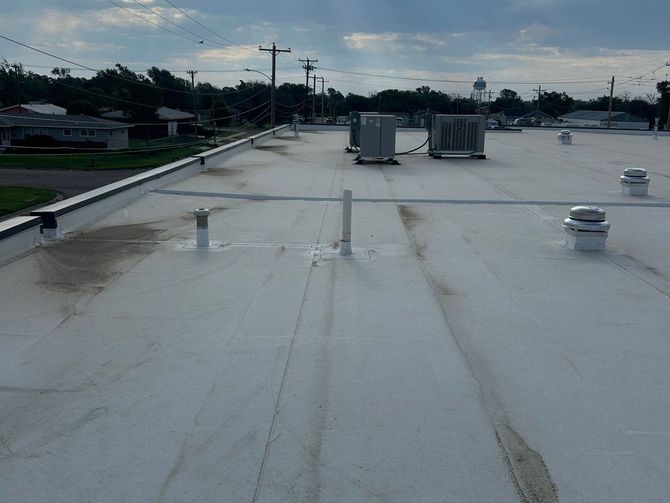Selecting the right industrial roofing system is key to protecting your property and ensuring long-term durability. Whether installing a new roof or maintaining an existing one, knowing your options and their benefits can save you time, money, and stress. Here’s what you need to know about industrial roofing.
Important Factors to Consider in Industrial Roofing Projects
Because industrial roofing projects are complex, understanding the unique requirements of your property is essential. Here are the key factors to consider:
- Building Use: Understanding the function of your building is key—whether it requires heat resistance, weatherproofing, or soundproofing. This will guide the selection of the best roofing system.
- Environmental Conditions: Different weather conditions, like extreme heat, heavy rainfall, or snow, can influence the durability of your roofing system. Choose materials suited to your area’s environment.
- Budget: While industrial roofing can be costly, finding the right balance between quality and affordability ensures you get the best return on investment.
- Energy Efficiency: Choosing energy-efficient roofing can reduce long-term utility costs. Consider materials that help improve insulation and lower heating and cooling expenses.
Types of Industrial Roofs: Built-Up, Metal, and Modified Bitumen
There are several types of roofing systems used in industrial applications, each offering distinct advantages depending on your building’s needs.
Built-Up Roofs (BUR)
Built-up roofing (BUR) is made of multiple layers, usually tar and gravel, offering excellent waterproofing. BUR is durable and well-suited for large industrial roofs, though its installation can be time-consuming.
Metal Roofs
Metal roofs are widely used in industrial settings because of their durability and low maintenance. They withstand harsh weather conditions and are energy-efficient, reflecting sunlight to cut cooling costs. Various materials, such as steel and aluminum, are available.
Modified Bitumen Roofs
Modified bitumen combines asphalt with rubber or plastic polymers, resulting in a flexible and durable roofing solution for low-slope buildings. Its resistance to leaks makes it a reliable choice for industrial structures.
Maintenance Tips to Extend the Life of Your Industrial Roof
Routine maintenance is vital to ensuring your industrial roof lasts longer and avoids expensive repairs. Here’s how to maintain your roof effectively:
- Regular Inspections: Have your roof inspected by professionals at least once a year to catch early signs of damage, like cracks, leaks, or debris buildup.
- Clean Gutters and Drains: Keep gutters and drains free of debris to avoid water accumulation that could damage your roof.
- Prompt Repairs: Address any issues quickly to prevent further damage. Delaying repairs can result in larger, more expensive problems later.
- Coating and Sealing: Applying a protective coating to your roof can help prevent moisture penetration and UV damage, extending its lifespan.
Why You Should Hire a Specialized Roofing Contractor for Your Industrial Roof
Hiring a specialized roofing contractor is essential for ensuring your roof is installed correctly and maintained properly. Experts can help you choose materials, manage the project, and provide long-term support.
Conclusion: Choosing the Right Roofing for Your Business
The right industrial roof is vital for property protection and long-term savings. Whether you choose BUR, metal, or modified bitumen, understanding each system’s advantages helps make the best choice. Partner with a roofing expert for optimal results.
Need help with your industrial roofing project? Contact us today for expert advice and a tailored solution to meet your needs!

#IndustrialRoofing #CommercialRoofing #RoofInstallation #BuiltUpRoof #MetalRoofing #ModifiedBitumen #RoofMaintenance #EnergyEfficientRoofing